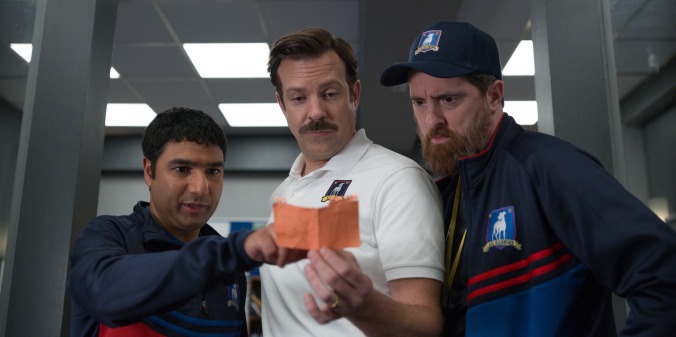Jason Sudeikis refines his comic persona on the new comfort-food sitcom Ted Lasso


Jason Sudeikis came up at Saturday Night Live alongside some expert caricaturists: He started on the show around the same time as Kristen Wiig, Bill Hader, and Andy Samberg, all well-versed in the art of creating characters from broad gestures and memorable physical flourishes. Although Sudeikis certainly had go-big moments during his eight seasons, his position at SNL was more like a youthful version of utility players like Phil Hartman or Will Ferrell—the sketch-comic everyman willing to play just about any man.
In his post-SNL career as a sort-of movie star, that flexibility has made Sudeikis difficult to pin down. Sometimes he plays nonchalant wiseasses in the mode of Chevy Chase or Bill Murray; sometimes he’s a grounded romantic lead like any number of ex-comedians switching to indie mode. He tends to work well in teams, because despite ample evidence of the material he likes to self-generate, it’s been hard to say what, exactly, the Jason Sudeikis comic persona really is.
On paper, Ted Lasso sounds like an attempt to recapture and redefine that persona well after the SNL magic has faded. It’s not quite based on an old sketch character, but it very nearly is; Ted Lasso first appeared in a pair of videos for NBC Sports, as a stereotypical American football coach blustering his way through a new job in the sport that the rest of the world calls just plain football, marveling at everything he doesn’t know about soccer. The Ted Lasso of these bits resembles the enthusiastically clueless sportscaster Pete Twinkle that he played opposite Will Forte in the endless series of “ESPN Classic” SNL sketches.
Transformed into a full-fledged Apple TV+ series, Ted Lasso drops the cluelessness but keeps the enthusiasm—and in doing so, reveals and deepens the Jason Sudeikis comfort zone. It turns out that the trait that unites many of his best characters is, in fact, enthusiasm, whether it’s for terrible music festivals, strippers, flirtatious banter, or coaching. What makes Ted Lasso both so warm and so funny is that Lasso is a ceaseless cheerleader who so steadfastly avoids negativity (beyond his newfound hatred for English tea) that he appears blithely unfazed by his team’s lack of wins.
That’s not to say that he regards soccer with indifference. Lasso arrives from Kansas to coach a Premier League team recently acquired by Rebecca (Hannah Waddingham) in her divorce from a high-profile (and shamelessly unfaithful) magnate. Unbeknownst to Ted, Rebecca has recruited him from his college football gig to tank her ex’s beloved team as revenge; unbeknownst to Rebecca, at least for a little while, is the full extent of Ted’s can-do ingratiation. He knows next to nothing about soccer, and refuses to let that deter him. He wants to learn, he wants to help his players, and he brings along his equally game (if vastly less loquacious) right-hand man and best pal, Coach Beard (Brendan Hunt), to assist him in this monumental challenge.
The coaches may struggle, but the show barely breaks a sweat. Situation comedies can take multiple episodes or even seasons to fully gel, and while the first few installments of Ted Lasso do feel more like an extended pilot than discrete episodes, they’re also remarkably surefooted as they introduce a funny, likable ensemble. The show develops the kind of rhythm that trains its audience to expect, even warmly anticipate, certain scene formats: Ted barging into Rebecca’s office to bond with his boss against all of her instincts; fumbling locker room pep talks for the skeptical players, who vary in age, race, and skill level; and heart-to-hearts between Rebecca and Keely (Juno Temple), the social media influencer who begins the series dating star player Jamie Tartt (Phil Dunster).
This all makes for hearty sitcom comfort food, though it’s worth noting how funny the jokes actually are; not always laugh-out-loud hilarious, but blessedly free of contemporary-sitcom fillers and underlines where characters comment upon the funny thing that may or may not have just happened. Co-creator Bill Lawrence was working the single-camera format before it was obligatory, and it shows: He lets Sudeikis talk fast, and the rest of the show keeps up without fussing over itself.
As good as the cast is, especially the multi-dimensional Waddingham and the sheerly delightful Temple, this is a showcase for Sudeikis, who co-created and developed the show with Lawrence. Starting from a one-joke character, they’ve reconstructed jock masculinity into something both funny and oddly touching. Sometimes the show lets this blur into full-on fantasy, portraying Ted as an unfailingly polite, respectful white man who actively avoids causing offense but nonetheless knows his way around a football field. It’s both a refreshing reversal of athletic stereotypes and, at times, a little difficult to believe—specifically, that this particular Kansas coach comes packaged with such a diverse and crowd-pleasing set of pop cultural reference points to inform his endless (and, yes, usually funny) folksy analogies.
What sells Ted Lasso as equally enamored of The Iron Giant, Kanye West’s 808s And Heartbreak, and any opportunity to crack a dad joke is, yes, that infectious Sudeikis enthusiasm—though it never quite cruises into coasting territory. As the season goes on, he has a chance to try out some more serious bits, as the show quickly raises some questions about why Ted was so willing to take a job he never asked for, thousands of miles away from his family. These 10 episodes cover enough interpersonal ground, and end satisfyingly enough, to engender some doubt over whether Ted Lasso has the stamina for an ongoing series, or if it’s more of an underdog sports movie extended and broken into chapters. Based on the last few episodes, it’s also entirely possible that the show could turn its quirky optimism into canned uplift—otherwise known as the Parks And Recreation problem. But if nothing else, the best moments of Ted Lasso finally reveal what a Jason Sudeikis vehicle could and should look like.